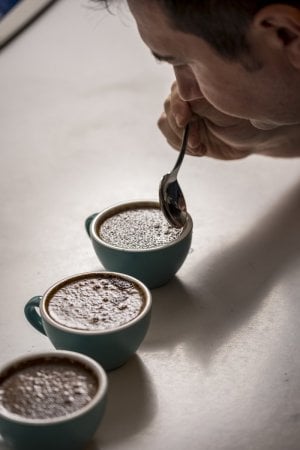Meet the man who gets paid to drink coffee all day at the Nescafé factory
Most of us Aussies love our coffee, despite the ever-increasing price tag these days. Imagine how awesome it would be to get paid to sip on it every day!
But what if instead of having 3 or 4 cups, you were downing dozens? And all the while keeping the jitters away?
This is precisely the reality for Glen Jones, the Quality Assurance Manager at the Nescafé factory in Gympie.
Jones goes by the title 'chief coffee taster' and samples about 100 cups of coffee every day at work.
‘On a daily basis, a lot of what I do is taste coffee,’ Jones said.
‘I would taste around about 100 cups of coffee a day, along with the rest of the quality assurance team.’
The factory produces 35 tonnes of coffee a day—that's equivalent to 20 million cups daily or 230 cups per second.
Jones said the quality assurance team plays a ‘vitally important’ role in maintaining the consistent quality of the coffee that the factory produces.
The team works diligently to rigorously test all the different products.
‘When we are tasting, it is very important to make sure that you haven't eaten anything or drunk anything other than water,’ Jones explained. ‘No smoking for at least half an hour before a tasting panel because it will affect your sensory bias.’
He continued, ‘At the same time, when you’re sitting down tasting, it’s important not to make facial expressions or make any noise because that might influence the next person tasting.’
During the process, coffee tasters use two spoons and have a reference cup for comparison.
They scoop some coffee with one spoon, transfer it to their tasting spoon, taste it, and then spit it out.
They conduct multiple taste tests throughout the packaging process. ‘It's to make sure we have the right cup of coffee,’ said Jones.
‘Coffee is really important to people,’ he said.
‘They want it to taste the same every single day they have it. And that’s our job. This is the line that is drawn, we have to make sure that every cup that goes out is the right quality every day.’
The quality assurance team tests not only the coffee's taste but also its appearance and smell.
On-site, team members receive ‘in-depth’ training to sharpen their coffee knowledge and palate.
Nescafe’s guide to tasting
Becoming a professional coffee taster isn't just about drinking coffee. It involves taking multiple examinations and building a refined taste through years of experience.
Why? Because coffee companies need experts to make sure every cup tastes perfect, given coffee's many flavours and aromas.
The Sensory Lexicon is the go-to guide in this profession, listing over 100 coffee flavours like floral, sweet and roasted.
Using this guide, tasters learn to spot the nuanced differences in coffee, influenced in part by where and how it's stored.
To get started, they must learn ‘cupping’ to identify 36-core coffee scents and hone their sensory skills.
This profession is intense, requiring unwavering dedication, patience, and a deep understanding of the entire coffee journey—from where coffee grows to how it's made—so that every cup tastes just right.

Members, how do you feel about this role? Would you consider tasting 100 cups of coffee daily and getting paid for it? Let us know your thoughts in the comments!
But what if instead of having 3 or 4 cups, you were downing dozens? And all the while keeping the jitters away?
This is precisely the reality for Glen Jones, the Quality Assurance Manager at the Nescafé factory in Gympie.
Jones goes by the title 'chief coffee taster' and samples about 100 cups of coffee every day at work.
‘On a daily basis, a lot of what I do is taste coffee,’ Jones said.
‘I would taste around about 100 cups of coffee a day, along with the rest of the quality assurance team.’
The factory produces 35 tonnes of coffee a day—that's equivalent to 20 million cups daily or 230 cups per second.
Jones said the quality assurance team plays a ‘vitally important’ role in maintaining the consistent quality of the coffee that the factory produces.
The team works diligently to rigorously test all the different products.
‘When we are tasting, it is very important to make sure that you haven't eaten anything or drunk anything other than water,’ Jones explained. ‘No smoking for at least half an hour before a tasting panel because it will affect your sensory bias.’
He continued, ‘At the same time, when you’re sitting down tasting, it’s important not to make facial expressions or make any noise because that might influence the next person tasting.’
During the process, coffee tasters use two spoons and have a reference cup for comparison.
They scoop some coffee with one spoon, transfer it to their tasting spoon, taste it, and then spit it out.
They conduct multiple taste tests throughout the packaging process. ‘It's to make sure we have the right cup of coffee,’ said Jones.
‘Coffee is really important to people,’ he said.
‘They want it to taste the same every single day they have it. And that’s our job. This is the line that is drawn, we have to make sure that every cup that goes out is the right quality every day.’
The quality assurance team tests not only the coffee's taste but also its appearance and smell.
On-site, team members receive ‘in-depth’ training to sharpen their coffee knowledge and palate.
Nescafe’s guide to tasting
Becoming a professional coffee taster isn't just about drinking coffee. It involves taking multiple examinations and building a refined taste through years of experience.
Why? Because coffee companies need experts to make sure every cup tastes perfect, given coffee's many flavours and aromas.
The Sensory Lexicon is the go-to guide in this profession, listing over 100 coffee flavours like floral, sweet and roasted.
Using this guide, tasters learn to spot the nuanced differences in coffee, influenced in part by where and how it's stored.
To get started, they must learn ‘cupping’ to identify 36-core coffee scents and hone their sensory skills.
This profession is intense, requiring unwavering dedication, patience, and a deep understanding of the entire coffee journey—from where coffee grows to how it's made—so that every cup tastes just right.
Key Takeaways
- Glen Jones tastes 100 cups daily at Nescafé, Gympie, for quality.
- The factory makes 35 tonnes of coffee daily, around 20 million cups.
- Tasters avoid food, drink, and expressions that might bias results
- The team checks coffee's taste, look, and smell and receives thorough training.










